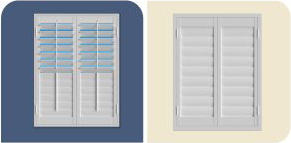
3 Ways Polywood Shutters Are Better Than Hollow Vinyl And Composite Shutters In Cleveland, Ohio
December 15, 2015
Wherever you look in Cleveland, there are plenty of plantation shutters choices. And when you want to know which non-wood shutter fits your home best, some differences may be tough to recognize. You can easily make the wrong choice and find yourself ordering low quality shutters. Are solid polymer shutters, like our best-selling Polywood® shutters, worth more than composite shutters? Find out the three ways Polywood shutters are better than composite shutters in Cleveland, Ohio to help you decide.
1. Polywood vs Composite Shutters Durability
Polywood shutters are fashioned from a top grade solid polymer that results in the most rigidity, color-retention, and durability than any other shutter on the market. With that, the shutter louvers will not chip over time. On the other hand, composite shutters are built from a pressed-board core, wrapped with poly-vinyl. The vinyl enveloping the pressed board also peels away from the core material readily. And this peeling happens even faster in hot, humid, and wet environments. Another option for non-wood shutters is hollow vinyl. But they disintegrate the fastest in large part due to the elements.Both types of non-wood shutters are susceptible to deterioration and warping when you consider all the weather conditions in Cleveland. Polywood is built with UV inhibitors that deflect heat. And because heat is the leading offender in chipping the shutter louvers, Polywood is without a doubt the longest lasting plantation shutter for your home.
2. Polywood vs Composite Shutters Color Fastness
Polywood shutters are available in three exceptional white paints. We bake the paint finishes on each part at hotter temperatures than Cleveland has seen. The patented finishing process uses UV inhibitors and ensures the color will never fade.
Other types of non-wood shutters finishes are limited to either low quality paint finish or no paint finish at all. In the majority of cases, the vinyl covering is the color you end up with. Although it looks good when installed, this finish fades as time goes by. And some hollow vinyls are painted. However, with the material easily conducting heat, this adversely influences the finish as time goes by.
3. Polywood vs Composite Shutters Energy Efficiency
Third party tests illustrate that Polywood shutters insulate against 30° of temperature and lead to reduction of heat transfer by up to 45%. This means that Polywood insulates up to 70% better than a similar solid wood shutter.
It’s the heat blocking properties of the solid polymer material Polywood’s made of that make these plantation shutters so energy efficient. Yet what makes Polywood even more energy efficient than composite shutters is the weatherstripping on the louvers and panels. All you have to do is interlock the pieces of weatherstripping when closing the panels to get the tightest seal possible against the effects of the weather outside. No composite shutter can offer the energy savings that Polywood does.
Our Vegas Team Experiences The Durability Of Polywood Shutters First Hand
Back in 2004, Sunburst Shutters Las Vegas had Polywood shutters attached to the sides of their trucks as part of the graphics. They were parked outside and sustained all the weather conditions Las Vegas is famous for. That means intense heat for almost five months each year!
Those shutters had been attached to our vehicles for almost 7 years at that point. Our team conducted a test on the color retention value of Polywood. So we wiped down the dusty Polywood shutter installed on the vehicle. And we held up a new Polywood shutter next it for comparison. The color hadn’t changed one bit. There wasn’t any visible signs of fading or discoloration. This was further validation for us that the Sunburst paint finish is the best in the market!
And since Polywood can endure so much abuse and heat on the side of a truck for 7+ years, it’s without a doubt the most durable shutter for your home in Cleveland, Ohio.


